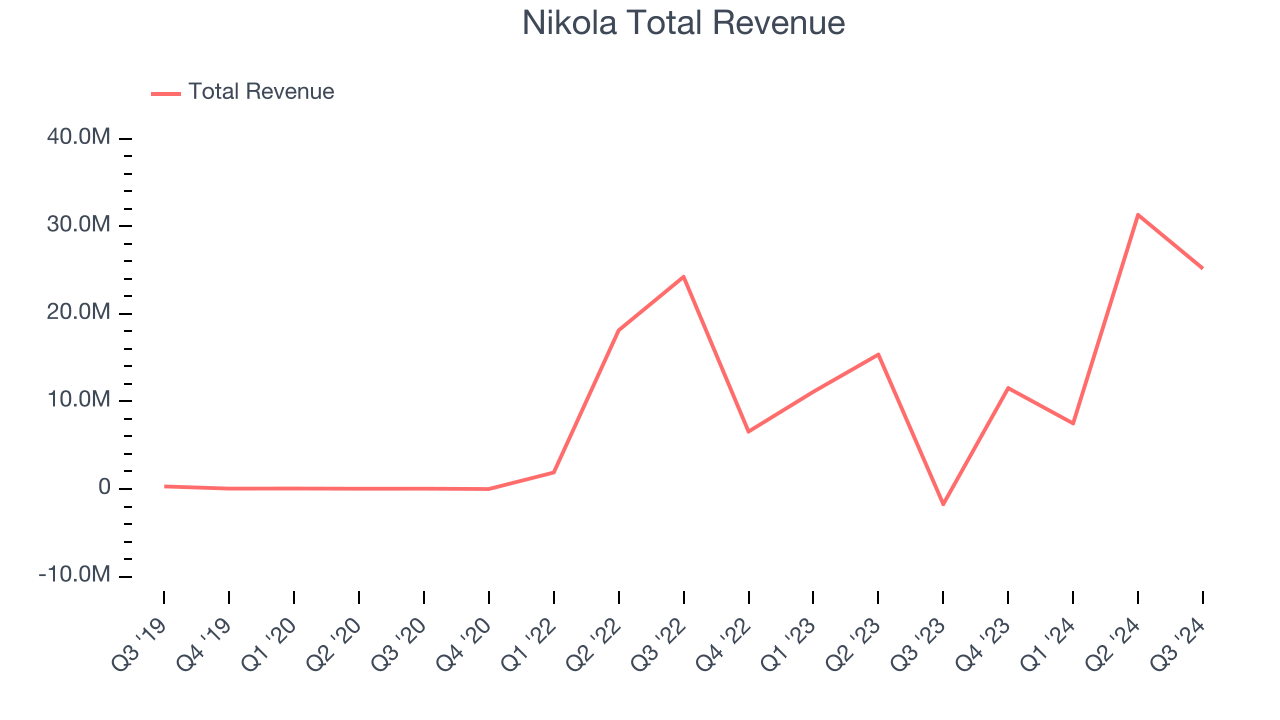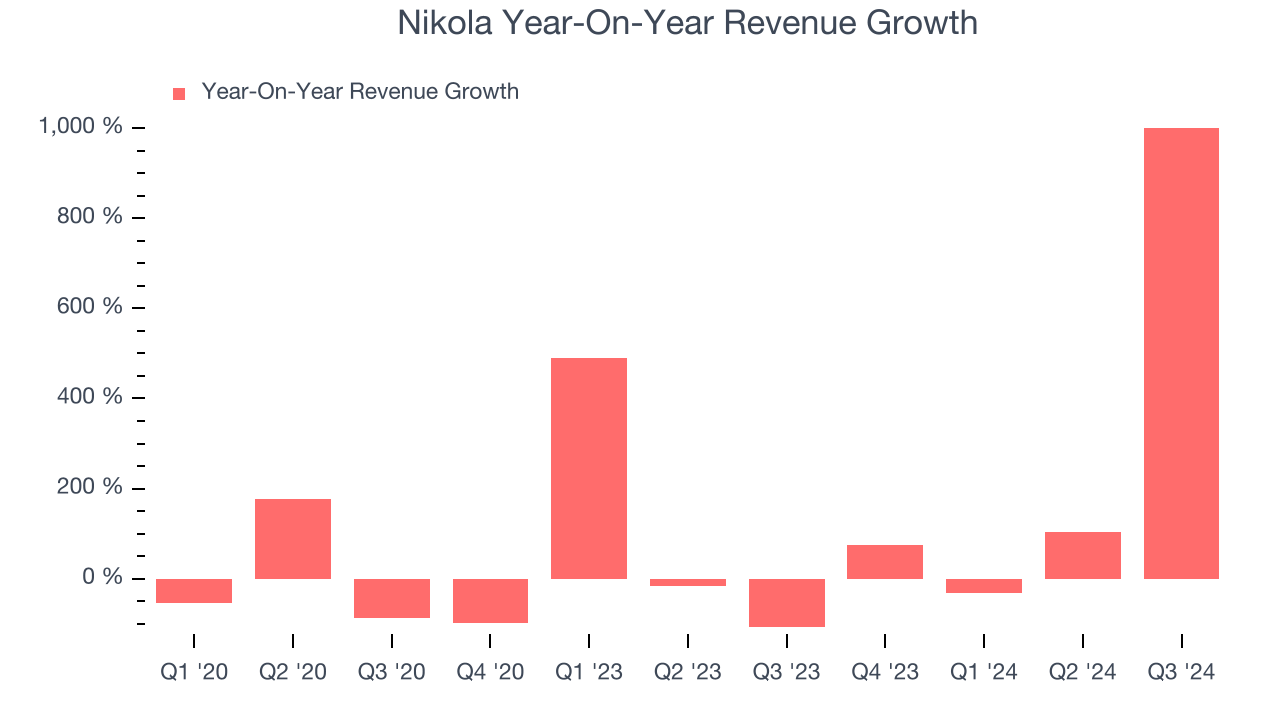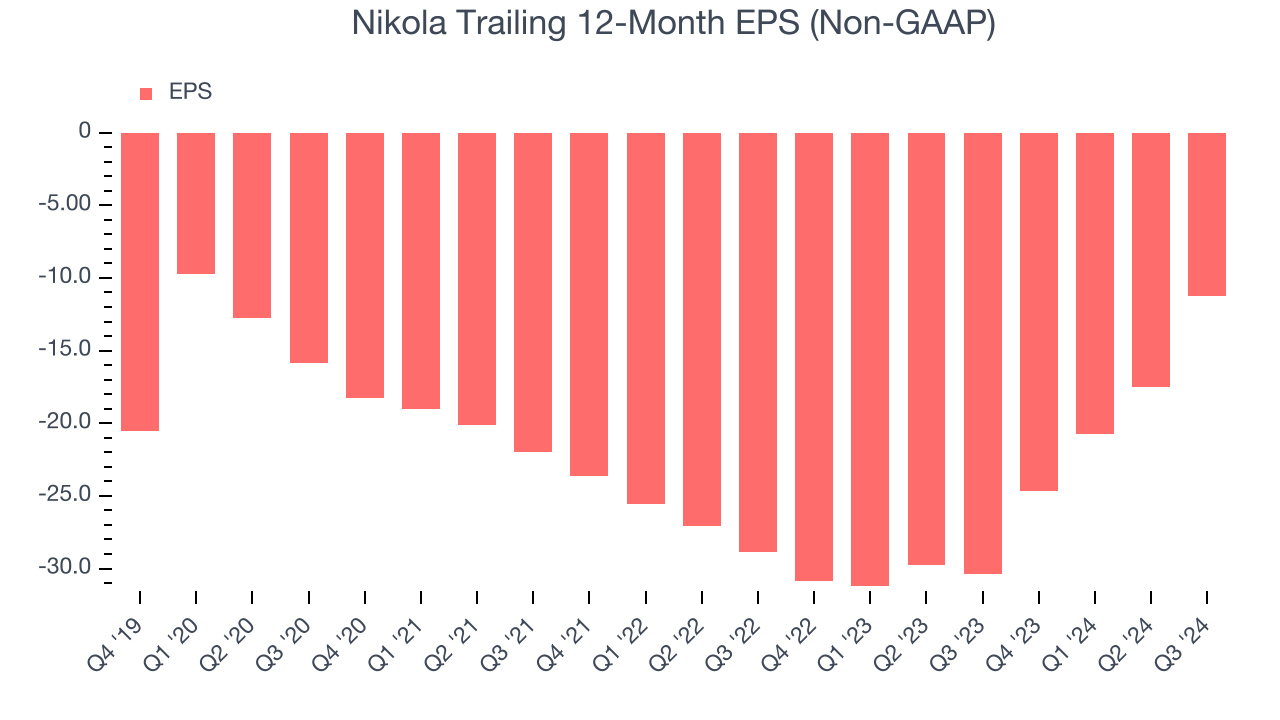
Electric vehicle manufacturer Nikola (NASDAQ:NKLA) missed Wall Street’s revenue expectations in Q3 CY2024, but sales rose 1,554% year on year to $25.18 million. Its non-GAAP loss of $2.75 per share was also 19.9% below analysts’ consensus estimates.
Is now the time to buy Nikola? Find out by accessing our full research report, it’s free.
Nikola (NKLA) Q3 CY2024 Highlights:
- Trucks Shipped: 90 vs analyst estimates of 88 (2.2% beat)
- Revenue: $25.18 million vs analyst estimates of $36.65 million (31.3% miss)
- Adjusted EPS: -$2.75 vs analyst estimates of -$2.29
- EBITDA: -$123.6 million vs analyst estimates of -$90.77 million (36.2% miss)
- Gross Margin (GAAP): -246%
- Operating Margin: -710%
- EBITDA Margin: -491%
- Free Cash Flow was -$162.9 million compared to -$111.9 million in the same quarter last year
- Market Capitalization: $214 million
"Year-to-date, we had record sales of hydrogen fuel cell electric trucks, a 78% increase in FCEV fleet adoption, and a nearly 350% increase in hydrogen fuel dispensed at our commercial stations," said Steve Girsky, President and CEO of Nikola.
Company Overview
Named after Nikola Tesla, Nikola (NASDAQ:NKLA) manufactures zero-emission vehicles, focusing on battery-electric and hydrogen fuel cell electric trucks.
Automobile Manufacturers
Much capital investment and technical know-how are needed to manufacture functional, safe, and aesthetically pleasing automobiles for the mass market. Barriers to entry are therefore high, and auto manufacturers with economies of scale can boast strong economic moats. However, this doesn’t insulate them from new entrants, as electric vehicles (EVs) have entered the market and are upending it. This has forced established manufacturers to not only contend with emerging EV-first competitors but also decide how much they want to invest in these disruptive technologies, which will likely cannibalize their legacy offerings.
Sales Growth
A company’s long-term performance is an indicator of its overall business quality. While any business can experience short-term success, top-performing ones enjoy sustained growth for multiple years. Thankfully, Nikola’s 172% annualized revenue growth over the last five years was incredible. This is a great starting point for our analysis because it shows Nikola’s offerings resonate with customers.

Long-term growth is the most important, but within industrials, a half-decade historical view may miss new industry trends or demand cycles. Nikola’s annualized revenue growth of 20.2% over the last two years is below its five-year trend, but we still think the results were good and suggest demand was strong. 
This quarter, Nikola achieved a magnificent 1,554% year-on-year revenue growth rate, but its $25.18 million of revenue fell short of Wall Street’s lofty estimates.
Looking ahead, sell-side analysts expect revenue to grow 321% over the next 12 months, an improvement versus the last two years. This projection is commendable and indicates the market thinks its newer products and services will spur faster growth.
Today’s young investors won’t have read the timeless lessons in Gorilla Game: Picking Winners In High Technology because it was written more than 20 years ago when Microsoft and Apple were first establishing their supremacy. But if we apply the same principles, then enterprise software stocks leveraging their own generative AI capabilities may well be the Gorillas of the future. So, in that spirit, we are excited to present our Special Free Report on a profitable, fast-growing enterprise software stock that is already riding the automation wave and looking to catch the generative AI next.
Operating Margin
Nikola’s high expenses have contributed to an average operating margin of negative 1,466% over the last five years. Unprofitable industrials companies require extra attention because they could get caught swimming naked when the tide goes out. It’s hard to trust that the business can endure a full cycle.
On the plus side, Nikola’s annual operating margin rose over the last five years, as its sales growth gave it operating leverage. Still, it will take much more for the company to reach long-term profitability.
This quarter, Nikola generated a negative 710% operating margin. The company's lack of profits raise a flag.
Earnings Per Share
Analyzing revenue trends tells us about a company’s historical growth, but the long-term change in its earnings per share (EPS) points to the profitability of that growth – for example, a company could inflate its sales through excessive spending on advertising and promotions.
Although Nikola’s full-year earnings are still negative, it reduced its losses and improved its EPS by 14.6% annually over the last five years. The next few quarters will be critical for assessing its long-term profitability. We hope to see an inflection point soon.

Like with revenue, we analyze EPS over a shorter period to see if we are missing a change in the business.
For Nikola, its two-year annual EPS growth of 37.6% was higher than its five-year trend. We love it when earnings growth accelerates, especially when it accelerates off an already high base.In Q3, Nikola reported EPS at negative $2.75, up from negative $9.04 in the same quarter last year. Despite growing year on year, this print missed analysts’ estimates. Over the next 12 months, Wall Street expects Nikola to improve its earnings losses. Analysts forecast its full-year EPS of negative $11.21 will advance to negative $7.30.
Key Takeaways from Nikola’s Q3 Results
Although it shipped more trucks than expected, Nikola missed analysts' revenue, EBITDA, and EPS estimates. Overall, this quarter could have been better. The stock remained flat at $4.23 immediately after reporting.
So should you invest in Nikola right now? When making that decision, it’s important to consider its valuation, business qualities, as well as what has happened in the latest quarter. We cover that in our actionable full research report which you can read here, it’s free.













